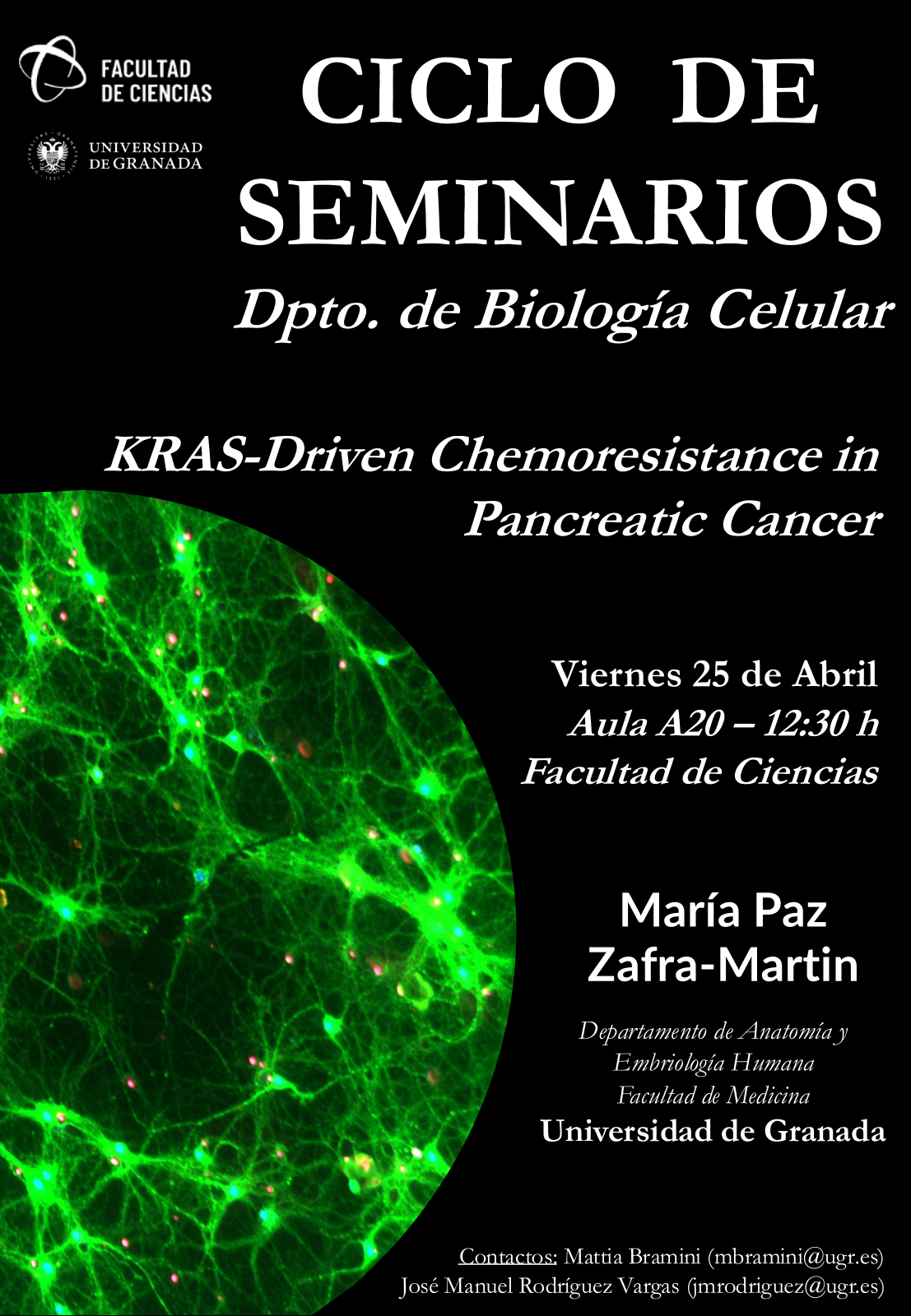Fecha: .
Hora: .
Lugar: Aula A20 - Facultad de Ciencias (UGR)
Ponente: Mª Paz Zafra joined Juan Antonio Marchal Lab at UGR in January 2022, after being granted with La Caixa junior leader postdoctoral fellowship. Her research experience is nurtured by interdisciplinary training. After finishing her degree in Biochemistry at Complutense University in Madrid, she worked at CIB-Margaritas Salas and IIS-Fundación Jimenez Diaz both placed also in Madrid, studying immune regulators as the inducible costimulatory molecule, dysregulated in autoimmune diseases and cancer, and SOCS3, a negative regulator or cytokine signalling mainly in T helper (type-2) disorders. After obtaining her PhD in 2015, she initiated her postdoctoral training, at Weill Cornell Medicine in New York, where she learnt gene editing to build accurate mouse models to precisely recapitulate recurrent cancer mutations. Since September of 2022 Dr. Zafra is a Ramón y Cajal researcher at Granada University, interested in understanding the importance of the genotype behind the phenotype to unravel a complex disease as cancer.
Resumen: Pancreatic cancer is a disease with a poor prognosis due to its low survival. Despite the efforts made by medicine in recent decades, the reality is that current treatments to fight pancreatic cancer are not effective. Part of the problem is the late diagnosis of the disease because the initial symptoms go unnoticed or are common to other diseases. Once diagnosed, most patients receive chemotherapy and, unfortunately, the development of resistance to such treatment is quite recurrent. Therefore, there is an urgent need to find new effective therapies to combat this devastating scenario. Our research is devoted to improve what is known as precision medicine. This concept applies to those therapeutic strategies where the specific characteristics of each patient are taken into account. In particular, we study tumors induced by mutations in the KRAS oncogene, which is altered in more than 95% of patients with pancreatic adenocarcinoma. Importantly, distinct alterations within the KRAS gene could be found across patients, and there is scientific evidence suggesting substantial differences among them in response to treatments. We aim to delve into the tumor biology and populations dynamics displayed by these different KRAS mutations in response to the gold standard treatment: chemotherapy, in order to uncover and characterized new targetable nodes and generate personalized therapies for each patient with pancreatic cancer.
Dentro del Ciclo de Seminarios - Dpto. de Biología Celular.
Contacto: Mattia Bramini, José Manuel Rodríguez Vargas.
Escribir un comentario
Información básica sobre protección de datos personales
Responsable: Universidad de Granada
Legitimación: La Universidad de Granada está legitimada para el tratamiento de sus datos, siendo de aplicación las bases jurídicas previstas en el art. 6.1 del RGPD que correspondan en función de la finalidad pretendida por usted en el formulario de contacto.
Finalidad: Gestionar su comunicación.
Destinatarios: No se prevén comunicaciones de datos, salvo que sea necesario para gestionar su solicitud.
Derechos: Tiene derecho a solicitar el acceso, oposición, rectificación, supresión o limitación del tratamiento de sus datos, tal y como se explica en la información adicional.
Información adicional: Puede consultar la información adicional y detallada sobre protección de datos, en función del tipo de tratamiento, en la UGR en el siguiente enlace





